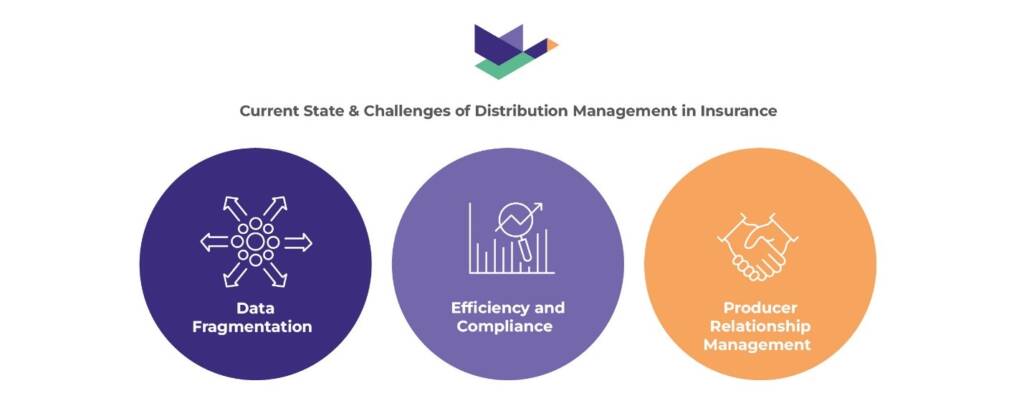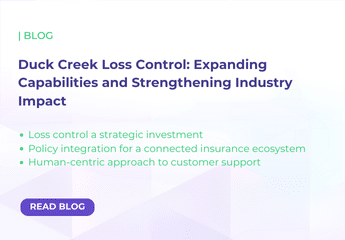In an evolving insurance landscape, distribution management has emerged as a critical factor in maintaining a competitive edge, fostering effective relationships with intermediaries, and accelerating business growth. Automation stands at the forefront of this initiative — a strategic pivot that has given rise to a suite of innovative solutions aimed at enhancing and streamlining various facets of insurance distribution management.
The Integral Role of Distribution Management in Insurance
Agents are the backbone of the insurance industry, playing a crucial role in the distribution and sale of insurance products. The carriers rely on marketing representatives to identify potential prospects and onboard producers who will sell their offerings. To stay competitive and compliant, insurance companies utilize distribution management systems, which streamline the onboarding process, ensure compliance, and support producer growth.
Current State & Challenges of Distribution Management in Insurance
In a world where digital transformation is rapidly redefining industries, the insurance sector is no exception. Distribution management, a vital component in the insurance value chain, challenges insurers to truly leverage its potential.

-
Data Fragmentation
Today, insurers often host performance data across different systems. This fragmentation hampers decision-making and strategic planning, creating a necessity for unified, actionable insights. In fact, a blog by BCG outlined how many insurers’ efforts to improve distribution through AI were hampered by the limitations of their legacy core systems, which heavily siloed data that would’ve otherwise improved churn and cross-selling rates.
-
Efficiency and Compliance
Carriers struggle with the complex and varying regulations across different states The carriers need to ensure that agents have the required licenses and appointments to sell their products in specific states. This involves notifying the state authorities about the agents. Additionally, carriers incur additional costs in managing compliance, including staffing costs for manual compliance management.
The issue of efficiency and compliance further amplifies with the rapid and high volume of regulatory modifications. According to the TRRI’s Cost of Compliance report, the primary compliance challenge in 2020 was coping with an average of 217 regulatory updates per day from over 1,000 regulatory bodies. This pace of regulatory changes is expected to increase, adding to the already intense challenge posed by current manual processes and outdated systems. Regulatory tasks such as background checks, license data imports, and compensation calculations can become herculean tasks without the right tools.
-
Producer Relationship Management
Traditional one-size-fits-all approaches are proving ineffective in managing diverse producers. Instead, personalized interaction and engagement strategies have become the need of the hour. A McKinsey report cited the importance of taking care of an insurer’s salesforce, such as through remote-only distribution, emphasis on joining teams, and expanding distribution channels as ways to support producers better.
Duck Creek Distribution Management: A Modern Solution
Against the backdrop of these prevalent challenges, Duck Creek Distribution Management emerges as a state-of-the-art solution designed to streamline and enhance the multifaceted process of insurance distribution. This innovative platform is not merely a tool but a transformative force that redefines how insurers manage their producer relationships, achieve operational efficiency, and maintain regulatory compliance while also empowering insurers with the benefits below:
-
Modern Producer Relationship Management
Duck Creek’s software provides an all-encompassing solution for managing producer relationships. It simplifies tasks and fosters more effective relationships by offering insurers a unified view of their producer network.
-
Enhancing Productivity Through Automation
Duck Creek’s system automates numerous operational tasks, such as background checks, training tracking, and compensation calculations. This reduces administrative overhead and improves accuracy, freeing up insurers to focus on strategic tasks.
-
Creating Personalized and Collaborative Relationships
Duck Creek’s software facilitates personalized and collaborative relationships with producers. It enables sales managers to create tailored onboarding experiences and targeted performance plans, fostering stronger relationships and driving growth for insurers. Thus, Duck Creek is heralding a new, efficient, and strategically focused era of distribution management.
4 Key Features of Duck Creek Distribution Management
In the era of digital revolution, Duck Creek Distribution Management stands out with its unique features designed to address the modern challenges of insurance distribution.
-
Onboarding & Compliance
The transfiguration of the onboarding process is noteworthy, signaling a departure from the cumbersome paper-based applications of yore to a more agile and accessible online system. This pivot not only catalyzes the onboarding experience but is further bolstered by timely compliance alerts that fortify adherence to regulatory mandates.
Perhaps most striking is the inclusion of the ‘Just in Time’ appointment mechanism, a cost-mitigation feature that enables carriers to appoint agents precisely when new business is acquired — a boon for cost-conscious operations, particularly in states that condone this approach.
The integration of the distribution management system with the carrier’s existing networks facilitates an uninterrupted transition into business engagement for agents as soon as their onboarding is finalized, thereby eradicating any potential for delay.
-
Performance & Relationship Management
Insurance carriers recognize the indispensability of robust agent relationships, which serve as the bedrock for sustained business growth and success. The product’s array of relationship management tools aids carriers in cultivating a productive environment that values and promotes stellar agent performance, setting the stage for a prosperous alliance between all vested parties.
-
Compensation Management
The seamless integration with policy systems symbolizes another facet of the product’s sophistication, providing immediate and unfettered access to the most up-to-date commission rates via the Distribution Management interface.
This level of integration ensures that agents receive their commission statements with alacrity, thereby upholding carrier-agent rapport. Compatibility with third-party payment systems underscores the system’s commitment to streamlined financial transactions, ensuring that the remittance of agent payments is both prompt and precise.
-
Agent Self-Service
It is also important to equip your agents with the necessary resources for performing updates and embracing digitalization. By enabling your agents with digital tools, you enhance their capabilities to deliver faster and more accurate support.
The availability of online platforms for commission and incentive reports greatly benefits both agents and carriers. By enabling agents to view their commission and incentive reports online, you empower them to track their progress and stay motivated. This transparency fosters a sense of ownership and can lead to increased productivity.
The Future of Distribution Management in Insurance
As we look to the future, the impact of technology – specifically AI, automation, and machine learning – on distribution management is expected to be significant. Duck Creek Distribution Management is well-equipped for these changes, incorporating flexible, scalable functionalities that align with the future needs of insurance carriers. A robust distribution management system is, thus, critical in driving the future of the insurance industry.





